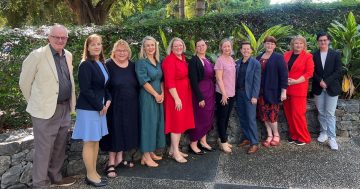
Recently at the annual ‘Walk Against Family Violence’, red shoes were laid out across the front steps of Victorian Parliament to symbolise those who’ve been affected. Photo: Facebook.
The Victorian Government has introduced a new bill to protect victim-survivors of gender-based violence.
At the time of writing, amendments to the state’s justice legislation are going through a second reading in the Lower House. Among the changes proposed, the Anti-vilification and Social Cohesion Bill will ban cross-examinations in committal hearings for victim-survivors of sexual violence, stalking and family violence.
These reforms will mean that complainants in these matters only need to be cross-examined by a defence barrister once, during the trial, with the intention of improving experiences of the justice system for victim-survivors.
Sexual Assault Services Victoria (SASVic) has welcomed the move, despite concerns in the legal community, with CEO Kathleen Maltzahn announcing their pleasure “to see the government taking action on this serious issue”.
“This change will maintain accused people’s rights while removing an unnecessary legal step that has created avoidable harm to survivors and slowed down the legal process,” said the peak body’s CEO.
SASVic has been pushing for a “long overdue” sexual violence plan in the state for some time. It made another call for action in April upon the release of data showing the equivalent of 26 sexual offences were happening each day in 2023.
While no such plan has been announced, legislative changes shown in the aforementioned bill have given the peak body hope for further gains to be made in the near future.
A fortnight ago the body launched a report with Fair Agenda, which sets out a legislative model to expand access to pre-recorded testimony. SASVic claims such a model will allow victim-survivors to give their evidence months, or even years before a trial, in a setting that supports their safety and wellbeing.

Victoria Legal Aid representatives were among those who marched in the ‘Walk Against Family Violence’ in the CBD and Dandenong. Photo: Facebook.
As for already enacted reforms that have begun delivering results, Victoria Legal Aid (VLA) came out last week to announce that the state’s first five specialist family violence courts are demonstrating real effectiveness in addressing gender-based violence.
The Victorian Government provides specific funding for a trauma-informed and collaborative model of legal services at the Shepparton, Ballarat, Moorabbin, Frankston and Heidelberg specialist family violence courts.
Under the model, VLA and Community Legal Centre (CLC) lawyers provide duty lawyer services to applicants and respondents in family violence intervention order matters. Non-legal support staff are also on hand to provide information, referrals to other services like housing, counselling or behaviour change programs.
Despite the significant disruption of COVID-19 and ongoing high demand at the courts, a recent evaluation by the Centre for Innovative Justice found the services to:
- Be in line with international best practice
- Help address people’s non-legal needs that can increase risk
- Contribute to improved safety by connecting to specialist support and legal assistance that can facilitate increased compliance with orders.
CIJ Associate Director of Research, Advocacy and Policy, Elena Campbell, said the evaluation showed that providing family violence informed legal assistance, as well as connection with services that addressed non-legal needs such as housing, could help to reduce risk by increasing understanding, accountability and compliance.
“The evaluation shows the importance of linking people with assistance that can address their legal and non-legal needs at the same time, ensuring that contact with the legal process can function as a positive intervention,” she added.
There are already 13 Magistrates Courts in Victoria designated as specialist family violence courts, however funding provided to the legal services is not consistent at all locations.
VLA and the Federation of CLCs have committed to advocating for sustainable and ongoing funding to extend the model to all regions of the state, along with another program of pre-court engagement, which provides early access to information and advice in family violence legal matters.











